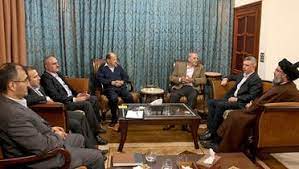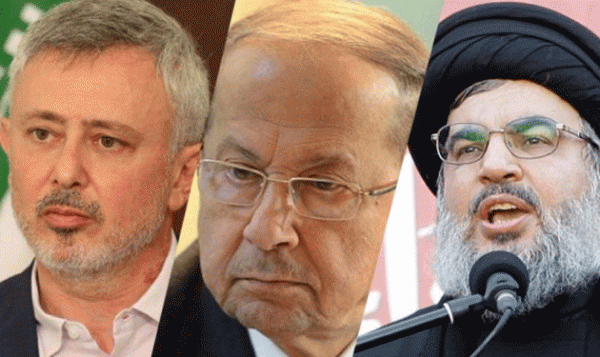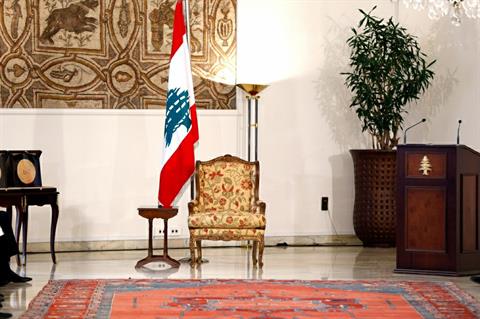
Concerns are growing over who will become the next president of Lebanon, especially after the Hezbollah-backed candidate was seen in the streets of Paris in recent weeks.
Lebanon has been without a president since October, when former President Michel Aoun’s term ended, and lawmakers have been unable to elect a successor.
Some argue that having no president is better than having one backed and supported by the Iran-backed Hezbollah and its allies.
Others see an opportunity to change the political scene in the crisis-struck country drastically. At the same time, a different set of observers believe a neutral candidate is needed for a transitional period.
In Washington, despite little attention being placed on Lebanon amid great power competition with China and the Russian invasion of Ukraine, there is bipartisan opposition to another presidential candidate aligned with Iran-backed camps.

The US position has been ambiguous as multiple officials have sent mixed signals about not having an issue with a Sleiman Frangieh presidency.
Saudi Arabia, which has significant influence in Lebanon, has been unwilling to support Frangieh in his bid.
It’s worth noting that the criticism by Frangieh’s minister George Kordah of the Saudi-led military campaign in Yemen against the Houthi rebels has further strained relations between Lebanon and Gulf countries
And while Gulf countries, including Saudi Arabia, look to unfreeze ties with Syria, the attitude on Capitol Hill has not changed. Reports of a regional or international-backed deal in Lebanon that would see a president, prime minister, central bank governor and army chief agreed in harmony with the rehabilitation of the Assad regime would face stiff opposition from the US Congress. Syria-related sanctions are in the process of being reinforced by Congress.
Joel Rayburn, the former deputy assistant secretary for Levant Affairs and special envoy for Syria, fears that the Biden administration’s softened approach toward Iran and its allies would allow for a Michel Aoun-like president again.
Rayburn said it would be a “complete shame” for the US to have to try to work with another Hezbollah-backed candidate for six years. Aoun’s son-in-law and former foreign minister, Gebran Bassil, was hit by US sanctions because of his close ties to Hezbollah.
.
Rayburn said the sanctions were meant to send a direct message that anyone who provided political or material support to Hezbollah would have a price to pay and would be unable to do business in US dollars.
Aoun was elected after former Prime Minister Saad Hariri and Lebanese Forces leader Samir Geagea, both seen as pro-West, threw their support behind him.
Today, one of the front-runners to succeed Aoun is Frangieh. Other names being circulated include former Lebanese politicians with a history of cooperating and answering requests for camps backed by Syria and Iran.
Frangieh was pictured in France earlier this month, where he reportedly met with Emmanuel Macron’s top advisor for the Middle East and North Africa. Pro-Hezbollah daily Al-Akhbar reported that Frangieh informed people close to him that France supported his candidacy.
Sources familiar with the ongoing discussions have told Al Arabiya English that France stubbornly supports Frangieh and has been pushing for his election despite Riyadh’s clear opposition, which was relayed to French officials in several meetings.
It has also been reported that Gilbert Chagoury, a Lebanese-Nigerian billionaire with close ties to the French, has played a key mediating role between the French and Frangieh.
Chaghoury was forced to pay $1.8 million in the US after being accused of conspiring to violate federal election laws in the US through illegal campaign contributions to US presidential and congressional candidates. According to the US Justice Department, he admitted to making illegal conduit contributions.
Frangieh was indirectly targeted under the Trump administration when they issued sanctions against one of his top aides, Yousef Fenianos.
This was meant to signal to Frangieh that he would be next on the list if he did not break his alliance with Hezbollah.
Rayburn, one of the main architects of the pressure campaign against Syria and Iran, said the targets included Aoun’s Free Patriotic Movement, Frangieh’s Marada Movement, Parliament Speaker Nabih Berri’s Amal Movement, and even Hariri’s allies. The latter had a “tacit relationship” with Hezbollah, according to Rayburn.
Other high-profile targets that were hit with US sanctions included Ali Hasan Khalil (Berri’s top aide and former finance minister from 2014-2020), Jihad al-Arab (close to Hariri) and Dany Khoury (close to Bassil).
Hariri stepped down weeks after the 2019 nationwide anti-government protests called for his government’s resignation. He has since bowed out of the political scene in Lebanon and currently resides in Abu Dhabi.
The previous US administration’s time ran out after Donald Trump lost his re-election campaign to Joe Biden. The pressure campaign was initially dialed back as the new administration tried to revive the 2015 nuclear deal with Iran.
Speaking about the sanctions campaign, Rayburn said the point was to try to impose a cost on political leaders and parties for their political alliances and cooperation with Hezbollah, “not just their material support or financial relations.”
He added: “We wanted to try to break the political coalition that Hezbollah was benefiting from inside Lebanon.”
Rayburn said sanctions need to be ramped back up in the short term. The US sanctioned the Rahme brothers earlier this month, which was initially suggested under the Trump administration.
“There is no other political strategy now, and the sanctions on the Rahme brothers is recognition of that,” Rayburn suggested.
Moving forward, Rayburn said the sanctions campaign on both Lebanon and Syria should be reinforced. He recommended that Washington push for truth and accountability in the devastating 2020 Beirut Port because the culprits would almost certainly be aligned with Hezbollah.
Fenianos was the transportation and public works minister until 2020. He has an arrest warrant tied to the explosion, and Frangieh has defended his decision not to show up for questioning.
Frangieh, a close friend of Bashar al-Assad, has repeatedly praised Hezbollah for its stance against Israel. He has been pictured alongside Imad Mughniyeh, a senior Hezbollah operative who played a key role in the bombing of the US Embassy in Beirut in 1983.
A rare picture of #Hezbollah slain commander Imad #Mughniyeh & Lebanese prominent politician Suleiman #Franjieh pic.twitter.com/Bz9to0mTMD
— Ali Hashem علي هاشم (@alihashem_tv) February 12, 2015
Mughniyeh, before he was assassinated in 2008 while in Syria, had been helping train and arm Shia militias in Iraq as they attacked US troops.
“It would be a shame to have a second [Lebanese] president with no ties with the US,” Rayburn said of Frangieh.
AL ARABIYA


Leave a Reply
You must be logged in to post a comment.